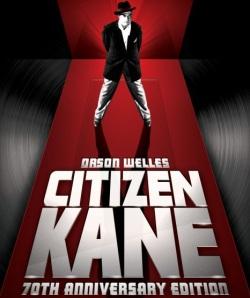I know exactly what you’re thinking: “He’s going to write about Rosebud—Charles Foster Kane’s dying word—and how it represents his lost childhood and how not even all the riches in the world can fill the void in a man’s heart—a void created by being torn from his family at such a young age and thrust into a life he never really wanted. He’s going to make the obvious biblical connection to Christ’s words, ‘What good is it for someone to gain the whole world, and yet lose or forfeit their very self?’ (
While all those things are true of Citizen Kane, I’m not going to bore you with the obvious. I’d like to approach our discussion of the film from a slightly different angle.
Twice named the greatest American film of all time, Citizen Kane is held by many as the gold standard of excellence in filmmaking. Everything from the screenwriting to the acting to the cinematography heralds the greatness of Orson Welles’ phenomenal film. For any readers who have not seen Orson Welles’ masterpiece (if you haven’t seen this film, you must) or who have not seen it in quite some time, let me give you a brief synopsis:
Citizen Kane tells the story of one Charles Foster Kane, a man who comes into an incredible fortune as a youth. His parents sign custody of him over to a wealthy caretaker who will see to it that Kane receives a proper education and will ready him to take ownership of a massive estate when he comes of age. As a young adult, Kane disregards most of the fortune that is now his, instead turning all his energy and efforts to a small New York newspaper. In time, his newspaper becomes the largest and most powerful in the country, making Kane the wealthiest and perhaps the most influential man in America. He makes a run for the governor’s office, but is blackmailed into dropping out of the race. His first marriage crumbles soon after, and he then marries a would-be opera singer. He spends his midlife years trying to make his second wife into a first-class star and building an enormous pleasure palace in the tropics of Florida. As he collects wealth, fortune and priceless works of art, he turns more and more inward, pushing away those who were once his closest friends and eventually his second wife. In the end, he is a lonely recluse surrounded by the treasures of the world, but with no one except the house staff to share it with. He dies alone in one of the many suites of his enormous house, uttering one dying word, “Rosebud.”
While Kane is the central character of the film, the story unfolds as a newspaper reporter tries to uncover the mystery of this last word uttered by Kane. Who or what was Rosebud? What was Kane trying to say in that dying breath? The reporter spends the 119 minutes of the film interviewing Kane’s business associates, friends and second wife attempting to discover the meaning of “Rosebud.” Unfortunately, after all these conversations and a tour of Kane’s home, the reporter must return home empty handed. In the final scene, we the audience learn the meaning, but those on the screen never do.
Although the reporter and those he talks to never find out the meaning of Kane’s dying word, one thing does become crystal clear: Kane was an incredibly lonely man. His closest friends, his lifelong business partners and his wife hardly knew Charles Kane the man. They knew his public persona and his business management style, but knew very little about him as a person. Not a single person knew him well enough or was close enough to him to have any idea of what “Rosebud” meant. On several occasions, several different people comment about how Charley Kane never let anyone get close to him, always keeping everyone at arm’s distance. He wanted love, but only on his terms.
What a modern-day tragedy: a man who has literally gained the whole world—he had everything he could ever want and millions of dollars left over—and yet had no one to share it with. He had it all, except that which could make him truly happy: love and companionship. My pastor always says the purpose of life is relationship, relationship with God and relationship with others. We are not meant to live in isolation, keeping others at arm’s distance. A life not shared with others is a life that has been wasted.
Take It Further (Questions to engage students in dialogue):
1. Who are your closest friends? How much do you trust them? Upon what is that trust based? What, if anything, prevents you from trusting them more?
2. How would you prefer to be remembered when you pass on? How do you think your friends will remember you? Is there a difference in your answer to those two questions? If so, what will you do about it?
Ryan M. Blanck is the author of Engaging the Media. Follow him on Twitter and like him on Facebook.




